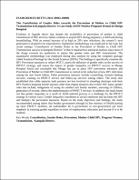| dc.description.abstract | IYAMUREMYE BETTY (2011-M092-20009)
The Contribution of Gender Roles towards the Prevention of Mother to Child HIV Transmission in Kampala District: A Case Study of HIV Positive Pregnant Women in Mengo Hospital.
Evidence in Uganda shows that despite the availability of prevention of mother to child transmission of HIV services, babies continue to acquire HIV during pregnancy, at birth and during breastfeeding. With an annual increase of as high as 20% new infections, the country‟s next generation is doomed to be unproductive. Qualitative methodology was employed as the topic has social settings “Contribution of Gender Roles to the Prevention of Mother to Child HIV Transmission success in Kampala District” in that it required less statistical analysis since most of the things covered are qualitative in nature like gender roles and HIV transmission. The quantitative methodology was employed during data analysis by using the computer package called Statistical Package for the Social Sciences (SPSS). The findings to specifically examine the HIV Prevention measures to reduce MTCT, assess the influence of gender roles on the success of PMTCT strategy, and assess the impact of gender inequality on PMTCT success in Mengo Hospital found and concluded that Mengo has put in place HIV prevention measures and Prevention of Mother to Child HIV transmission is central in the reduction of new HIV infections among the new borne babies. Other prevention measure include counselling, formula feeding services, training on PMTCT service and follow-up services among others. The study also established that while majority male partners are less involved in attending checkups with their HIV-Positive pregnant female spouses, other than stigma instances due to their HIV status, gender roles that include; obligations of caring for another sick family member, nurturing of children, generation of income, affects the implementation of PMTCT services. In addition, the study found out that gender inequality as a result of AIDS-induced poverty is a challenge for the PMTCT strategy in various ways. Gender inequality contributes to social conditions that facilitate the HIV and hampers the prevention measures. Based on the study objectives and findings, the study recommended among others that besides government through its line ministry of Health putting up more PMTCT facilities, all stakeholders be it government or non-government put more emphasis in ensuring gender equalities in terms of employment, education and income if is to be realised.
Key Words: Contribution, Gender Roles, Prevention, Mother-Child HIV, Pregnant Women, Transmission, Kampala District. | en_US |


